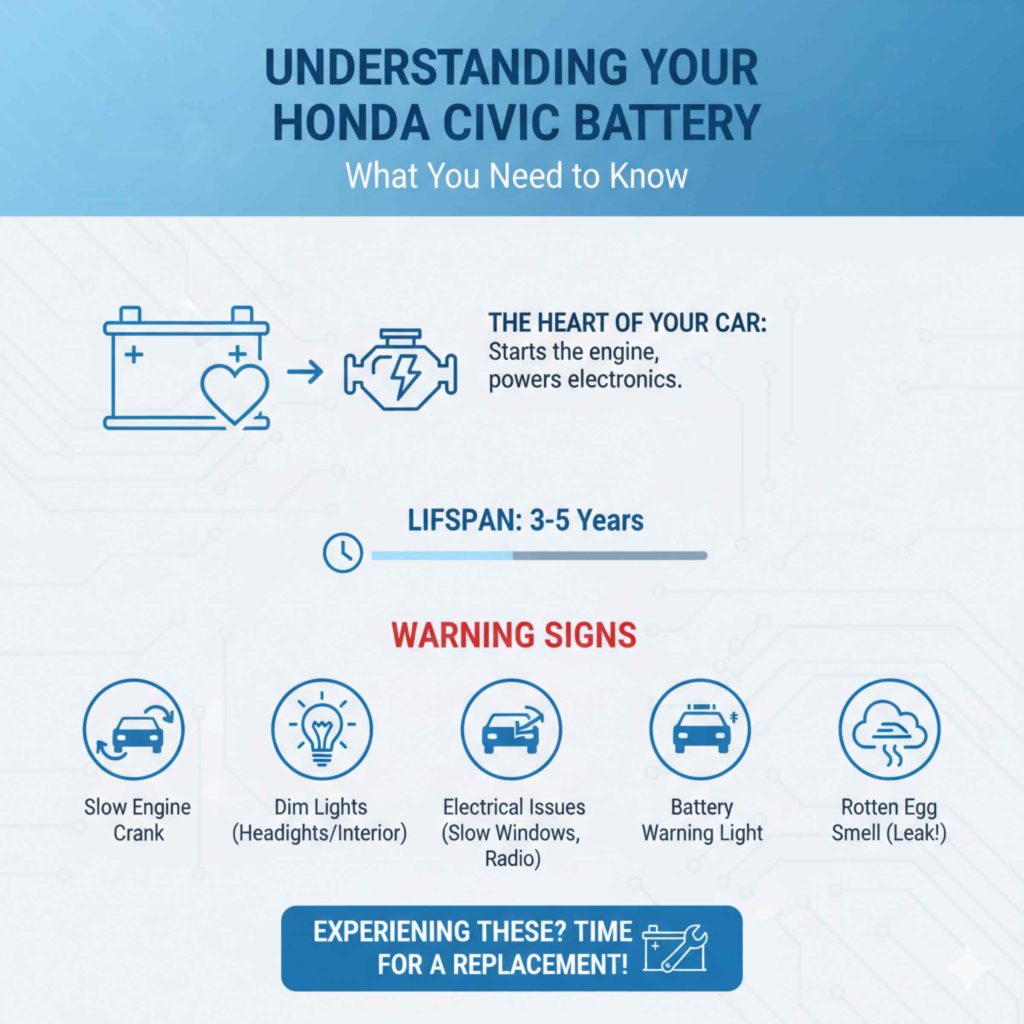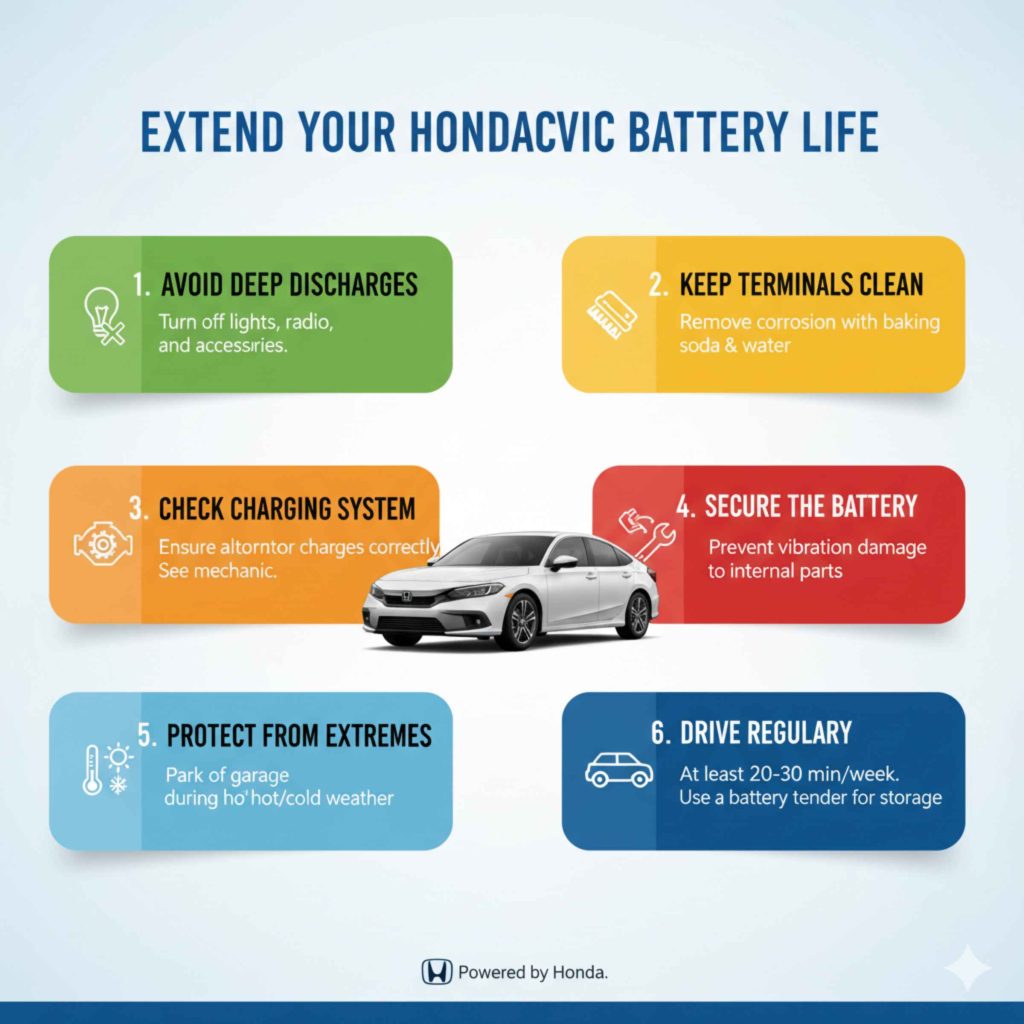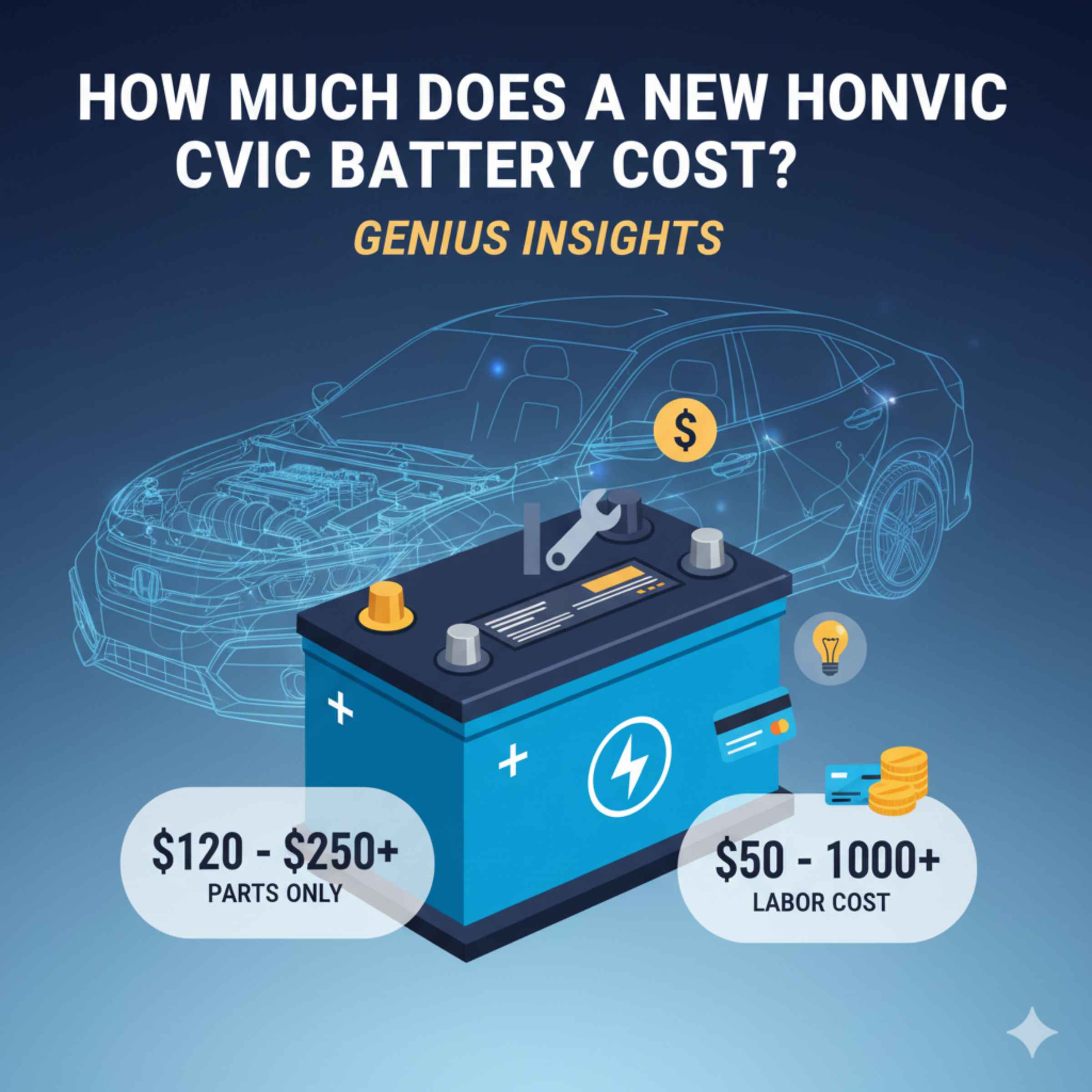A new car battery for a Honda Civic typically costs between $150 and $300. This price includes the battery itself and installation, though DIY installation can significantly reduce costs. The exact price depends on the battery’s brand, type (like absorbed glass mat or flooded lead-acid), and where you purchase it.
Is your Honda Civic having trouble starting? Do you hear a slow crank, or nothing at all? It’s a frustrating experience, but often, the culprit is a simple one: a dead car battery. Knowing how much a new battery for your Civic might cost can help you budget and avoid surprise repair bills. Don’t worry, this guide breaks down everything you need to know, making it easy to understand without all the confusing car talk. We’ll look at typical prices, what affects them, and how you can get the best value. Let’s get your Civic back on the road with confidence!
Understanding Your Honda Civic Battery: What You Need to Know
Your car battery is like the heart of your vehicle. It provides the initial surge of power to start the engine and also keeps your car’s electrical systems running when the engine is off, like the radio and interior lights. Over time, batteries wear out. Think of it like a phone battery – it doesn’t hold a charge forever. For a Honda Civic, a typical battery can last anywhere from 3 to 5 years, depending on its quality, your driving habits, and the climate you live in.
When your battery starts to go bad, you’ll notice some signs. These can include:
- Slow engine cranking when you try to start the car.
- Dim headlights or interior lights.
- Electrical issues, like windows rolling up slowly or a malfunctioning radio.
- The battery warning light on your dashboard flashing.
- A strange smell of rotten eggs coming from under the hood (this can indicate a leaking battery, which needs immediate attention!).
If you’re experiencing any of these, it’s probably time to consider a replacement. But before you head to the auto parts store, let’s dive into the actual cost.

How Much Does a New Honda Civic Battery Cost? The Breakdown
When asking “how much does a new car battery cost for Honda Civic,” it’s important to understand that there isn’t one single price. Several factors influence the final cost. Here’s a general idea of what you can expect:
| Service Type | Average Cost Range (USD) | Notes |
|---|---|---|
| Battery Purchase Only (DIY) | $100 – $250 | You buy the battery and install it yourself. |
| Battery Purchase & Professional Installation | $150 – $300 | Includes the cost of the battery and labor at a mechanic or dealership. |
| Premium/Specialty Batteries (e.g., AGM) | $200 – $400+ | Higher performance batteries often cost more. |
As you can see, the core of the cost is the battery itself. The brand and type of battery will play a big role. Installation is where you can save money if you’re comfortable doing it yourself. Many auto parts stores offer free battery testing, and some even offer free installation if you purchase the battery from them.
Factors Affecting Honda Civic Battery Price
Let’s break down what makes one battery cost more than another for your Honda Civic:
- Battery Brand: Just like with any product, some brands are known for higher quality and reliability, and thus, they might come with a higher price tag. Major brands like Interstate, Optima, ACDelco, and DieHard often have a reputation for durability.
- Battery Type: The most common type for many vehicles, including older Civics, is the flooded lead-acid battery. However, newer Civics, especially those with advanced technology or start-stop systems, might require or benefit from an Absorbed Glass Mat (AGM) battery. AGM batteries are more expensive but offer better performance, longer life, and are more resistant to vibrations and extreme temperatures.
- Battery Size and Power (Group Size): Your Honda Civic requires a specific battery size and type, often referred to by a “group size” (e.g., Group Size 51R is common for many Honda models). While prices for the same group size can vary, ensuring you get the correct size is crucial.
- Warranty: A longer warranty period, often 3-5 years of free replacement, usually means a higher upfront cost. This warranty is a good indicator of the manufacturer’s confidence in their product’s longevity.
- Retailer: Prices can differ between dealerships, national auto parts chains (like AutoZone, O’Reilly, Advance Auto Parts), independent repair shops, and online retailers. Dealerships often have the highest prices, but offer OEM (Original Equipment Manufacturer) parts and expert installation.
- Location: Sometimes, regional economic factors or local demand can slightly influence pricing.
Understanding Battery Types for Your Civic
For your Honda Civic, you’ll likely encounter a few main types of batteries:
- Flooded Lead-Acid (Conventional): These are the most common and affordable type. They work well for standard vehicles. They require occasional maintenance, like checking the electrolyte levels, though many are “maintenance-free” with sealed tops.
- Absorbed Glass Mat (AGM): These batteries are more advanced. The electrolyte is held in fiberglass mats between the plates. They offer better deep-cycle capabilities, are more vibration-resistant, and can handle charging more efficiently. They are often required for cars with start-stop technology or high electrical demands. While more expensive initially, they can last longer and perform better in extreme conditions.
To find out which type is best for your specific Honda Civic model, you can check your owner’s manual or look at the existing battery. If your Civic came equipped with an AGM battery, it’s usually best to replace it with another AGM battery to ensure optimal performance of your car’s electrical systems.
DIY vs. Professional Installation: Which Saves You More?
This is a big question for many car owners. Deciding whether to install the battery yourself or have a professional do it can impact your total cost and peace of mind.
Installing It Yourself (DIY)
Pros:
- Significant Cost Savings: This is the primary advantage. You’ll only pay for the battery itself, saving anywhere from $50 to $150+ in labor costs.
- Convenience: You can do it on your own schedule, without needing to book an appointment.
- Learning Experience: It’s a great way to learn more about your car and boost your DIY confidence.
Cons:
- Requires Tools: You’ll need a few basic tools.
- Safety Concerns: Batteries contain acid and can be heavy. Proper handling is crucial to avoid injury or damage.
- Potential for Errors: Incorrect installation can lead to electrical problems or the battery not working correctly.
- Disposal Hassle: You’ll need to properly dispose of your old battery. Many auto parts stores take them back for recycling.
Basic Tools You’ll Need for DIY Installation:
- Wrench set or socket set (typically 10mm and 12mm are common for battery terminals and hold-downs).
- Gloves (acid-resistant are best).
- Safety glasses.
- A wire brush or battery terminal cleaner.
- Anti-corrosion spray (optional, but recommended).
For a step-by-step guide on replacing your Honda Civic battery, you can refer to resources like this guide on It Still Runs, which provides helpful visuals and instructions.
Professional Installation
Pros:
- Expertise and Speed: Professionals can often swap out a battery in minutes.
- Warranty Assurance: Many shops offer a warranty on both the battery and the installation work.
- No Tools Needed: You don’t need to buy or find any tools.
- Proper Disposal: They handle the recycling of your old battery.
- Safety Guaranteed: The job is done with proper safety precautions.
Cons:
- Higher Cost: You’ll pay for labor, which increases the overall expense compared to DIY.
- Scheduling Required: You need to book an appointment, which might not fit your immediate needs.
Where to Get Professional Installation:
- Honda Dealership: Always has OEM batteries and certified technicians. Can be the most expensive.
- National Auto Parts Stores: Many offer free installation with battery purchase. Great balance of cost and convenience.
- Independent Repair Shops: Can be a good option, especially if you have a trusted mechanic.
Cost Comparison: If a battery costs $150 and professional installation charges are $75, your total is $225. If you do it yourself, you save $75 but need to ensure you have the tools and take the precautions.
Where to Buy Your Honda Civic Battery
You have several options when it’s time to purchase a new battery for your Honda Civic. Each has its own advantages.
1. Auto Parts Stores (Local & National Chains)
Stores like AutoZone, O’Reilly Auto Parts, Advance Auto Parts, NAPA, and Pep Boys are popular choices.
- Pros: Wide selection, competitive pricing, often offer free battery testing and free installation with purchase, knowledgeable staff.
- Cons: Selection might be limited to major brands rather than OEM.
2. Dealerships
Your local Honda dealership is a reliable place to get a battery.
- Pros: You’ll get an OEM (Original Equipment Manufacturer) battery that’s designed specifically for your Civic model, ensuring perfect fit and performance. Technicians are trained on your specific vehicle.
- Cons: Usually the most expensive option, even for the battery itself.
3. Big Box Retailers with Auto Centers
Stores like Walmart or Costco might have auto centers or sell automotive batteries.
- Pros: Can offer very competitive prices, especially for their house brands.
- Cons: Installation services might be limited or less readily available. Selection might not be as extensive as dedicated auto parts stores.
4. Online Retailers
Websites like Amazon, Batteries Plus Bulbs (which also has physical stores), or specialized battery sites.
- Pros: Huge selection, potential for great deals, convenient delivery to your door.
- Cons: You’ll likely need to install it yourself, and you can’t see the battery before buying. Returns can be more complicated.
Tip: Always check the warranty offered by the seller. A longer warranty, especially a free-replacement period, can offer great value and peace of mind.
Extending the Life of Your New Honda Civic Battery
Once you’ve invested in a new battery, you’ll want it to last as long as possible. Here are some tips:
- Avoid Deep Discharges: Don’t leave lights, radio, or accessories on after turning off the engine. This drains the battery excessively.
- Keep Terminals Clean: Corrosion can build up on the battery terminals and posts, hindering the flow of electricity. Clean them occasionally with a wire brush and a mixture of baking soda and water.
- Check Charging System: Ensure your car’s alternator is charging the battery correctly. A faulty alternator can overcharge or undercharge the battery, reducing its lifespan. Your mechanic can test this.
- Secure the Battery: Make sure the battery is firmly held in place. Excessive vibration can damage the internal components of a battery.
- Protect from Extreme Temperatures: While batteries are designed to withstand some heat and cold, prolonged exposure to extreme conditions can shorten their life. Parking in a garage during very hot or very cold weather can help.
- Drive Regularly: If your car sits for long periods, the battery can lose its charge. Try to drive it at least once a week for 20-30 minutes to allow the alternator to recharge the battery. For extended periods of non-use, consider a battery tender or maintainer.

Frequently Asked Questions About Honda Civic Batteries
Q1: How long does a Honda Civic battery usually last?
A new Honda Civic battery typically lasts between 3 to 5 years. This can vary based on battery quality, climate, driving habits, and vehicle maintenance.
Q2: Can I replace my Honda Civic battery myself?
Yes, most Honda Civic battery replacements can be done by a DIYer with basic tools and mechanical knowledge. It’s a straightforward process, but safety precautions are important.
Q3: What tools do I need to change a Honda Civic battery?
You’ll generally need a wrench or socket set (common sizes are 10mm and 12mm), gloves, safety glasses, and a wire brush for cleaning terminals. An anti-corrosion spray is also helpful.
Q4: Do dealerships charge more for batteries compared to auto parts stores?
Yes, dealerships typically charge more for car batteries and installation than most auto parts stores. However, they offer OEM parts and specialized service for your Honda.
Q5: What is an AGM battery, and does my Honda Civic need one?
An AGM (Absorbed Glass Mat) battery is a more advanced, premium battery type. Your Honda Civic might need one if it has advanced features like a start-stop system or high-demand electronics. Check your owner’s manual for your specific model’s requirements.
Q6: How do I dispose of my old Honda Civic battery?
It’s crucial to dispose of old car batteries properly, as they contain hazardous materials. Most auto parts stores will accept your old battery for recycling when you purchase a new one. You can also check with local recycling centers or hazardous waste disposal facilities.
Q7: What does a battery warranty typically cover for a Honda Civic?
A typical battery warranty for a Honda Civic battery covers defects in materials and workmanship. Most warranties offer a free replacement period (e.g., 3 years) followed by a prorated period where you get a partial credit towards a new battery.
Conclusion: Smart Choices for Your Honda Civic Battery
Replacing your Honda Civic battery doesn’t have to be a mystery or a budget-buster. By understanding the factors that influence cost – like brand, type, and where you buy it – you can make an informed decision. Whether you opt for a cost-effective DIY installation or the convenience of professional service, knowing the price range of $150 to $300 for a new battery, including installation, gives you a clear picture.
Remember to consider the warranty and the type of battery that best suits your Civic’s needs. Keeping those terminals clean and driving regularly can help your new battery serve you reliably for years to come. Now you have the genius insights to tackle this common car care task with confidence, keeping your Honda Civic starting strong on all your journeys.

